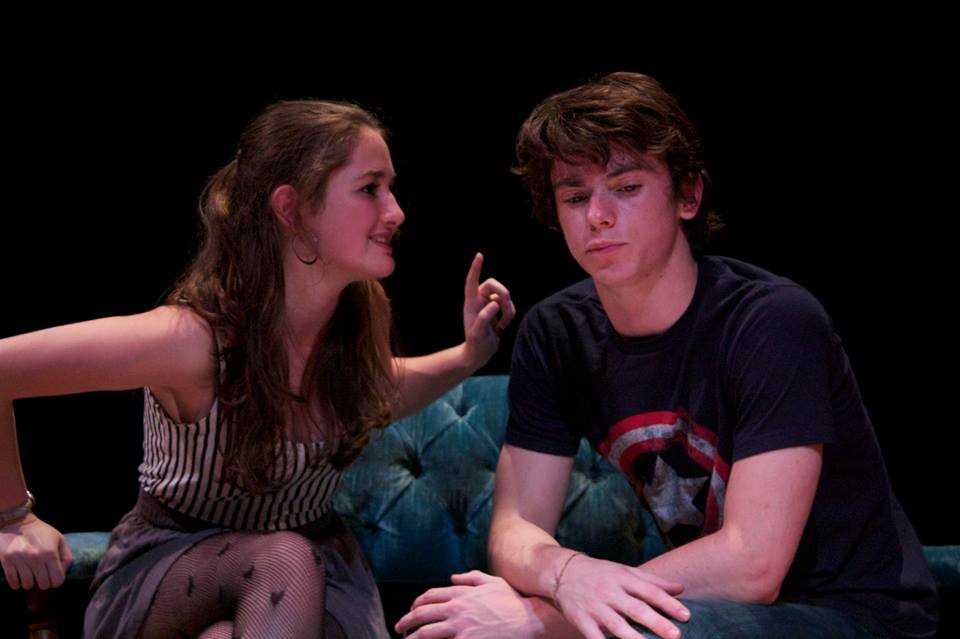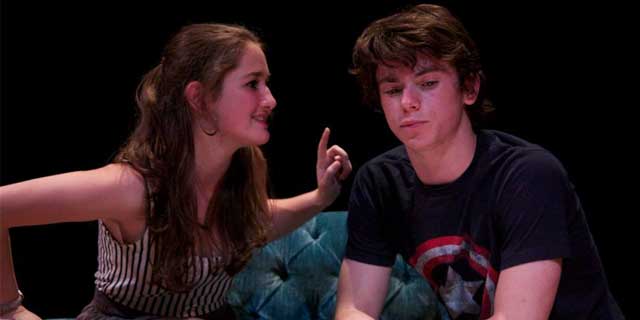
The Alex Cohen Theater was teeming with excitement on Friday October 18th in anticipation of the first installment of the Studio Theatre Series, “Seminar,” by Theresa Rebeck, directed by Juliet Lewis (VI). In contrast with the full theatre the set was bare, including only a few chairs and a couch drawn around a small coffee table. The actors utilized the versatility of the space by shifting around the furniture and by entering and exiting from different entrances.
In her large apartment on the Upper West Side of New York City, the lonely aspiring writer, Kate (played by Annie Nelson, form VI), hosts an expensive private writing seminar taught by Leonard (David Fishman, V), a formerly successful writer with a penchant for recounting tales of his recent adventures abroad. Participants consist of the flirtatious Izzy, (Eva Neuwirth, V), pretentious Douglas, (Maxwell Gutterman, IV), and somewhat standoffish Martin (Adam Ettlebrick, V). Students quickly find that Leonard is no easy critic, and within the first couple of scenes Kate accuses him of sexism and assumes he is particularly harsh to her because of her feminist views and privileged upbringing.
The complexity of each of the characters challenged the student actors
Not one of the characters are perfect: they all have secrets. Douglas finds out through his well-connected uncle that Leonard plagiarized a piece of work many years back and that is why he has been in ‘hiding,’ working as an editor and secretly writing things at home that he does not intend on publishing. The plot thickens as Izzy writes stories about sex to appease Leonard, Kate threatens to leave the group, and Douglas is deeply offended by Leonard. Martin has written thousands of pages of literature without showing anyone, until Leonard gets his hand on the writing. The romantic relationships in the play are continually changing, in part due to Leonard’s fixation with younger women.
The complexity of each of the characters challenged the student actors in a way that characters in many other plays to not. Annie Nelson, for instance, initially found it difficult to understand “the motivations behind a lot of what Kate does.” By the end of the play, however, she realized that “most of Kate’s conflicts come from within herself.”
“Seminar,” which originally came to Broadway in 2011, is a relatively new play despite its complex storyline. As Juliet Lewis wrote in her director’s note, the play “has many layers, full of different ideas and meanings.” There does not seem to be any concrete message from the play, but one could conclude that being a writer or an artist involves a huge amount of self-sacrifice. Juliet decided to direct this play because she felt “it was particularly relevant at Fieldston,” especially the themes of gender, education, and privilege. Nevertheless, she continued, “My interpretation of the play is not particularly important.” Rather, it is the message the audience walks away with that matters the most.
All four participants of the seminar walk away from the class with uncertain futures and careers so the audience can only wonder what kind of an impact it truly had. Given the challenges that the play presented, the actors did an extraordinary job of bringing each of their flawed characters to life.






